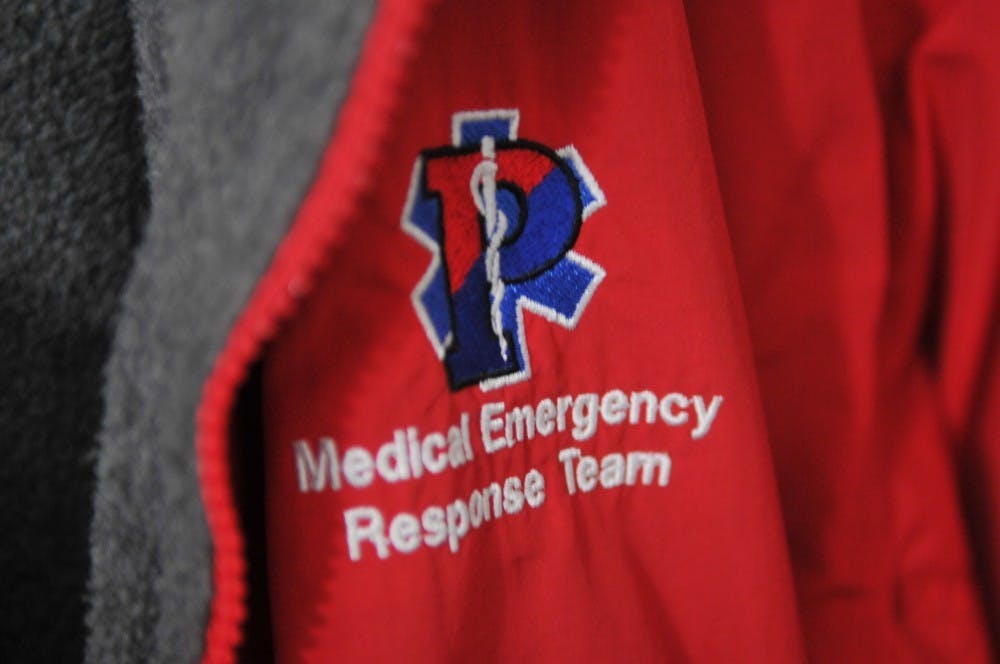
Penn’s Medical Emergency Response Team (MERT)—a student-run organization that provides emergency medical services to the Penn community—will continue operate this semester.
Despite pandemic-related health restrictions, Penn’s Medical Emergency Response Team is still operational and prepared to respond to emergencies in the Penn community this semester.
MERT — a student-run organization that provides emergency medical services to the Penn community — has continued to work closely with the Department of Public Safety to complement services provided by the University of Pennsylvania Police Department and the Philadelphia Fire Department throughout the fall and spring semesters. Joshua Glick, MERT's medical director and a 2010 College graduate, said MERT has had to change a number of its typical protocols to keep its 46-member team as safe as possible.
Glick said that keeping the MERT team safe from COVID-19 is their top priority. When the dispatch center receives a call and the patient is showing signs of COVID-19, a MERT member is not sent to respond to the call.
“I definitely feel like we’re safe — there’s so many measures in place. We’re being safe but still being effective,” Engineering and Wharton senior and MERT volunteer David Alanis said.
MERT EMTs are eligible to receive the COVID-19 vaccine under phase 1A of Pennsylvania’s vaccine distribution plan because of their status as healthcare workers and first responders, College senior and MERT chief Andrew Lam said.
“We expect the majority of MERT members to be fully vaccinated by the end of [February],” Lam said. “It’s important that we protect them as much as we protect our patients.”
When MERT arrives at the scene of an emergency, they screen the patients for COVID-19 symptoms from a distance before approaching to administer care. If the patient answers "yes" to any of the screening questions, the MERT team member will not engage until a member of the fire department arrives on scene.
For situations in which waiting for the fire department to arrive could be life-threatening, the MERT team member is allowed to choose personally whether or not to engage with the patient, but only with full personal protective equipment.
To support MERT's work, the University has agreed to give MERT team members access to expedited testing, but any member who has a potential exposure must quarantine for 10 to 14 days before responding to calls, regardless of the test result.
Penn’s chief of Fire and Emergency Services Eugene Janda said that MERT “has gone above and beyond the PennOpen Pass'" precautions to protect their members.
While MERT has continued its work for the Penn community, it has had to change its protocol for working out of their headquarters at Samson Place East.
“MERT is a very social organization. When you're working on shift, the tendency is that you use the squad room to hang out — they sleep in bunk beds, they hang out on the couch, they watch TV, they do homework together, and none of that can really happen with COVID,” Glick said.
Students who live nearby the scene of an emergency are asked to respond to calls from their places of residence instead of spending their on-call hours at MERT's headquarters. For those who must come in, only one person is allowed in each bunk room at a time, and members must complete a cleanliness checklist on their way in and out.
In addition to dispatch differences, Alanis said he has noticed that since the beginning of the pandemic, there has been a shift in the types of calls MERT has received.
“We’ve been getting a greater proportion of calls that are medical and trauma scenarios in comparison to any intoxications,” Alanis said.
Trauma calls are for injuries due to force, such as a fall or a car crash, while medical calls are for illness. Typically, many of MERT’s calls fall under a third category, intoxication, due to drugs or alcohol, said Alanis.
“MERT responds to all kinds of medical emergencies; we don’t just respond to alcohol and intoxication," Alanis said. "I feel like that’s a common misconception some students in the Penn community might have.”
Similarly, Lam said he wants students to know MERT is still here to help even amid the pandemic.
“We especially want the [first-years] who did not have [New Student Orientation] to know that we exist. We want them to know that we’re here to help them and that they can reach us for any medical emergency and that we’re doing everything to make our patients and the EMTs as safe as possible during COVID-19,” Lam said.
MERT's hours have remained the same, operating from Monday to Friday from 5:00 p.m. to 7:00 a.m., and 24 hours on Saturday and Sunday. MERT will also continue to provide service to their normal locations this semester between Baltimore Avenue and Market Street, and between 30th and 43rd streets.
The Daily Pennsylvanian is an independent, student-run newspaper. Please consider making a donation to support the coverage that shapes the University. Your generosity ensures a future of strong journalism at Penn.
Donate






